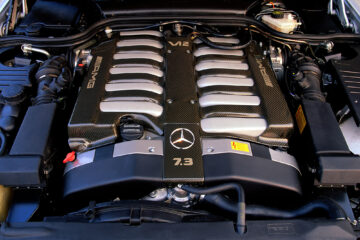Mercedes M113 Engine: A Brief Overview
The Mercedes M113 engine, introduced in the early 1990s, marked a significant advancement in automotive engineering for the German automaker. This V8 engine was designed to power a range of Mercedes-Benz vehicles, from sedans to SUVs, and was celebrated for its robust performance and smooth operation. With a displacement of 4.3 to 5.5 liters, the M113 was engineered to deliver a balance of power and efficiency, making it a popular choice among luxury car enthusiasts.
Historical Context and Development
The M113 engine was part of Mercedes-Benz’s strategy to enhance its lineup with more powerful and efficient engines during a time when competition in the luxury vehicle market was intensifying. The engine’s design incorporated advanced technologies for its time, including a lightweight aluminum construction and a DOHC (dual overhead camshaft) configuration, which contributed to its impressive performance metrics. Over the years, the M113 engine underwent various updates and modifications, leading to different variants that catered to specific models and performance needs.
Despite its initial acclaim, the M113 engine has not been without its share of problems. As with any complex machinery, issues have surfaced over time, raising concerns among owners and potential buyers. Understanding these problems is crucial for anyone considering a vehicle equipped with this engine, as they can impact both performance and safety. In the following sections, we will delve deeper into the specific issues associated with the M113 engine, providing a candid assessment of its reliability and the implications for vehicle owners.
Common Issues with the Mercedes M113 Engine
The Mercedes M113 engine, while known for its performance and durability, has been plagued by several notable problems that can affect its longevity and reliability. Understanding these issues is essential for current and prospective owners, as they can lead to costly repairs and diminished vehicle performance.
Oil Consumption Problems
One of the most frequently reported issues with the M113 engine is excessive oil consumption. This problem can arise due to several factors:
- Worn piston rings
- Valve guide wear
- Faulty PCV (Positive Crankcase Ventilation) system
Excessive oil consumption can lead to engine damage if not addressed promptly. Owners may notice that they need to top off oil levels more frequently, which can be indicative of underlying issues.
Cooling System Failures
The M113 engine is also susceptible to cooling system failures, which can result in overheating. Common causes include:
- Water pump failure
- Radiator leaks
- Thermostat malfunctions
Overheating can cause severe engine damage, including warped cylinder heads and blown head gaskets. Regular maintenance of the cooling system is crucial to prevent these costly repairs.
Timing Chain Tensioner Issues
Another significant problem with the M113 engine is related to the timing chain tensioner. Over time, the tensioner can wear out, leading to:
- Timing chain slack
- Increased engine noise
- Potential engine misfires
If the timing chain becomes too loose, it can jump teeth on the sprocket, resulting in catastrophic engine failure. Regular inspection of the timing chain and tensioner is essential for maintaining engine health.
Fuel System Problems
Fuel system issues can also plague the M113 engine, leading to poor performance and increased emissions. Common problems include:
- Clogged fuel injectors
- Fuel pump failures
- Faulty fuel pressure regulators
These issues can result in rough idling, decreased fuel efficiency, and difficulty starting the engine. Addressing fuel system problems promptly can help avoid more severe engine complications.
Electrical System Failures
The electrical system in the M113 engine can also be a source of frustration for owners. Common electrical problems include:
- Faulty ignition coils
- Malfunctioning sensors
- Wiring harness issues
Electrical failures can lead to erratic engine behavior, including misfires and stalling. Regular diagnostics can help identify and rectify these issues before they escalate.
Symptoms and Consequences
Understanding the symptoms associated with the M113 engine problems is vital for early detection and prevention of severe damage. Below is a table summarizing common symptoms and their potential consequences:
| Symptom | Potential Consequence |
|---|---|
| Excessive oil consumption | Engine wear and damage |
| Overheating | Warped cylinder heads, blown head gaskets |
| Increased engine noise | Potential timing chain failure |
| Rough idling | Poor fuel efficiency, starting issues |
| Engine misfires | Stalling, decreased performance |

0 Comments